#camille desmoulins mention
Explore tagged Tumblr posts
Text
WAIT GUYS I'M ACTUALLY TWEAKING RN I WAS JUST AT SPEECH THERAPY AND YK DOING ALL MY STUTTERING THINGS BUT LIKE EVERY TIME I STUTTERED OR HAD A BLOCK STUTTER AND WE DID LIKE FLUENCY STRATEGIES, AFTER DOING THE STRATEGIES FOR A BIT, EVERY SINGLE TIME, I ACTUALLY EVENTUALLY GOT EVERY SINGLE WORD OUT!? LIKE WHAAAAAAAAAT!?! LIKE I COULD ACTUALLY TALK?!?! Y'ALL HONESTLY DON'T UNDERSTAND HOW DEEP THIS IS, I'VE HAD A SEVERE STUTTER SINCE I COULD TALK AND THIS IS ACTUALLY SO COOL REEEEEEE THERE ARE LITERAL TEARS IN MY EYES AND NOW I FEEL LIKE DESMOULINS AT THE BASTILLE AND I ASSURE YOU HE FELT THE EXACT SAME WAY BECAUSE OMG WHAaaATTTTTTATATATATAAT!?!?!?¡¡!¡!¡!¡!
#and no this doesnt mean my stutter is “cured”#thats physically impossible#i just slayed today! :D#stuttering#stutter#speech impediment#speech impairment#camille desmoulins#sorta#camille desmoulins mention#yeah#that works better#BUT SERIOUSLY THO#:DDD#reeeeee#REEEEEEEEEEEEEEEEEEEE#speech therapy
29 notes
·
View notes
Text



Guys hear me out on my ghost Camille AU-
I had this idea in my mind for about some time now, where basically Camille comes back (in ghost form) after his death and haunts Maxime. It was very interesting to me how the Terror become much worse after Camille’s execution, and I always viewed it as the cause of his death(at least, one of the reasons). And I thought it would be quite interesting to make an AU out of it:)! Feel free to add anything onto this original idea of mine, I’ll be very happy to see your take on this!
#frev#french revolution#maximilien robespierre#robespierre#camille desmoulins#saint just#he’s mentioned#so I guess he’ll be tagged#is this very silly???#idk#it just makes me sad to think about them two
136 notes
·
View notes
Text
Imagine working at museum carnavalet. You sit in a chair all day and nearly no one asks you anything. Suddenly, a strange high school girl approaches you.
"Do you work here?" she says. Imagine you dont know a word in english. So you look at her weird. And now, imagine she hands you this sign:

You are confused. A little intimidated. Then she talks again.
"Eh...oui....j'adore la revolution...je..uh...a l'école...(not even true cause i study it by myself but i didnt know the verb to study) Can I... photo?????"
You nod.
And so she does.

You are now very amused and so you tell her to pose. And she does.

What a funny encounter.
#jokes aside#that lady was so sweet to me#after i said i liked frev (with my broken french) she just said#“enchantee”#SHE WAS SO CUTE#and she started walking me around the museum#i understood like two words she said#but i was very interested and i strongly reacted to everything like “Oh god. omg. noway”#i dont know who was more confused me or her#after i took these photos i said hi to robespierre and we had to rush away to see b*naparte tomb#when i visit this museum again with more time#i better see both camille and that lady#frev#frevblr#camille desmoulins#frev fandom#im camille number one fan now#its official#the lady at the museum confirmed it#frev community#maximilien robespierre#mentioned???
50 notes
·
View notes
Text
Going back to my short film:
I'm at a bit of a crossroads in whether or not I want to include Camille in it (my family is not helpful in this retrospect)
In the current script I have, he's not named and it relies more on people being aware of who he is and what his relationship to Robespierre is.
As far as he goes plotwise and adding to the story, I added him in order to develop Robespierre a bit more an elude to the guilt and remorse he feels.
He has a singular word said ("Maxime", overlapping Saint-Just's "Maxime-!" when Robespierre shoots himself), and is mainly a silent precense at the end of the film.
It is very apparent he is in fact dead (in my opinion at least) given that he does have a bloody gash across his throat in it (concept shown below).
At first I thought for people unfamiliar with him and the more intimate aspects it the revolution, maybe he could be taken as an angel of deaths or embodiment of death of sorts? But now I'm not sure

#any thoughts much appreciated#this is a v limited summary so if any questions#please feel free to ask#(this is a school project)#(i feel like i should mention that)#frev community#frevblr#frev#frev art#french revolution#robespierre#maximilien robespierre#camille desmoulins#robesmoulins#not directly shown in the film...#but its implied...#and by that i mean i was thinking abt it#saintspierre is more implied but ssshhh
16 notes
·
View notes
Text
Rare footage of the French Revolutionaries desperately trying to upheld the Revolution's ideals with their writing:

#french revolution#frev#history#frevblr#frev community#frev memes#jean paul marat#camille desmoulins#maximilien robespierre#louis antoine de saint just#not you Hébert you don't get a mention#history memes#history shitposting#1700s
33 notes
·
View notes
Text


Almost out of nowhere Roland spends 3 pages describing her body, face, accomplishments etc. only for it to be lead up to Camille slander lol
#it’s the first time him or any frev guy is mentioned too#at the beginning of frev she was pretty close to Robespierre and talked to Danton#so I’m surprised she never met Camille#left in the part where she compares him to an old coxcomb cause it’s funny to me#frev#madame roland#camille desmoulins#camille#The Private Memoirs of Madame Roland
18 notes
·
View notes
Note
Do we know the favorite books that the French revolution figures liked to read? (It could be anyone, Robespierre or Saint just or Louis xvi it doesn't matter).
Much like this old ask about revolutionaries’ favorite dishes, I can’t say I know of any instance of someone exclaiming: ”this is 100% my favorite book,” but at tops people mentioning books that they thought were good or bad:
In his memoirs, Brissot writes he’s picking up Rousseau’s Confessions for the sixth time, so I guess that could qualify as a favorite book? send help
We have this list of books seized at Robespierre’s place after his death.
According to the memoirs of Élisabeth Duplay, Robespierre would read ”the works of Corneille, Voltaire and Rousseau” for her family in the evenings.
In a short biography over Desmoulins written in 1834, Marcellin Matton claims his favorite book was René Aubert de Vertot’s Histoire des révolutions arrivées dans le gouvernement de la République romaine (1719), of which he always carried a copy. Matton is an infamous romanticizer it’s from him we have the stupid leaf myth for example, but I’m willing to give him some leeway here since he could have obtained the information from Camille’s mother-in-law and sister-in-law, who were his friends:
In one of his first classes, he received Vertot's Révolutions romaines as a prize. Reading this work transported him with admiration; in the future, he always had a volume in his pocket. It was for him an indispensable companion, it was his vade mecum. He used or lost at least twenty volumes. It is perhaps to this excellent work and to the particular work that he did on the discourses of Cicero and especially on his Philippics, that we owe the lively and sharp style which distinguishes all the writings coming from the pen of Camille .
Desmoulins was however less fond of Rousseau’s Confessions, in number 55 (December 1790) of Révolutions de France et de Brabant he admits that he abandoned the book after getting infuriated by it:
Not that I idolize J.J. as I did in the past, since I saw in his Confessions that he had become an aristocrat in his old age. How far he was from looking at an Alexander with the pride of this Cynic, to whom he is compared, and how painfully I saw that he united the opposite faults of Diogenes and Arisippus! It is a pleasant thing to hear the author of the Social Contract protest in his Confessions about the simplicity of the commerce of such great lords (M. and Madame de Luxembourg) he cries with joy, he wants to kiss the feet of this good marshal, because he wanted to accompany one of his friends, an office clerk, for a walk. Is there anything smaller, more ridiculous? I received, he says elsewhere, the greatest honor that a man can receive, the visit of the Prince de Conti, (an honor that Rousseau shared with all the girls of the Palais-Royal.) At this point I tossed away the book out of spite, and I admit, that I had to reread the speech on equality of conditions, and Julie's novel, in order to not hate the philosopher of Geneva, like Durosoy and Mallet du Pan; for the same principles, in the mouth of such a great man, are more condemnable and worthy of aversion than in the mouths of our two gazetteers, whom God created poor in spirit, and predestined as such to the kingdom of heaven.
In a diary kept over the summer of 1788, Lucile Desmoulins mentions reading L’Âge d’Or (1782) by Sylvain Maréchal (of which she also copied two verses, Le Trésor and Le contrat de mariage devant la nature, in a notebook the year earlier), Les Idylles et poèmes champêtres (1762) by Salomon Gessner, L’Hymne au soleil, suivi de plusieurs morceaux du même genre qui n’ont point encore paru (1782) by Abbé de Reyrac (where she wrote down the verse La Gelée d’avril), Nouvelles lettres anglaises, ou Histoire du Chevalier Grandisson (1754) by Samuel Richardson and Les Noces patriarchales, poëme en prose en cinq chants (1777) by Robert Martin Lesuire.
In his memoirs, Buzot mentions enjoying the works of Rousseau and Plutarch:
With what charms I still remember this happy period of my life which can no longer return, when, during the day, I silently roamed the mountains and woods of the city where I was born, reading with delight some works of Plutarch or of Rousseau, or recalling to my memory the most precious features of their morality and their philosophy. Sometimes, sitting on the flowering grass, in the shade of some thick trees, I indulged, in a sweet melancholy, in the memories of the sorrows and the pleasures which had in turn agitated the first days of my life. Often the cherished works of these two good men had occupied or maintained my vigils with a friend of my age whom death took from me at thirty, and whose memory, always dear and respected, has preserved from many errors!
Wow any chance you can sound even more like an 18th century man stereotype, Buzot?
…and that’s basically all I can come up with for the moment. But add on if you know anything more! @louis-antoine-leon-saint-just @lazarecarnot maybe you would like to share your favorite books with us if you have any?
#frev#ask#robespierre#desmoulins#lucile desmoulins#buzot#brissot#camille actually being the only sane person
62 notes
·
View notes
Text
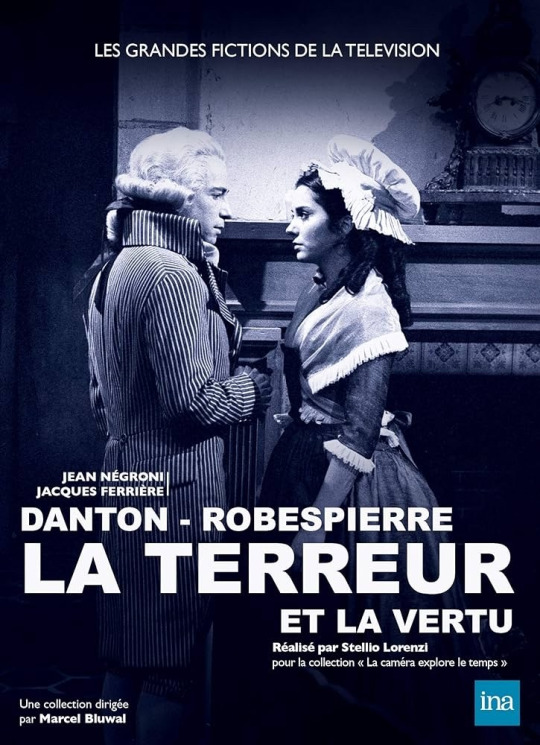
I already talk about horrible movie about the frev. Today I will make a critic about the bad points about a good movie with a very good historical accuracy that I really like but it’s also important to criticize good historical films even if we liked them as a whole (I must say that I liked them personally and I continue to do so) . Firstly, even if it may not have been the intention, because it was not the theme of the show as the writers had planned several themes with the people, including the Night of Varennes, I didn't like that the politicians were seen prominently while the people were too much in the background (minor criticism because the show was discontinued after the success of 'La Terreur et la Vertu,' so maybe they intended to do it later).
Next, the women of the French Revolution are too sidelined, and Lucile Desmoulins is portrayed more as simply worried for Camille Desmoulins without showing Lucile's political side, which accentuates the sexism. Camille Desmoulins is depicted as more naive than he actually was, in my opinion, perhaps to absolve or infantilize him, I don't know.
I would have liked it if we briefly mentioned the retaking of Lyon by Couthon, even just in passing. We have 4 representatives of the indulgent faction (Fabre d'Eglantine, Danton, Camille Desmoulins, and Philppeaux) compared to only 2 on the Hebertist side (Hébert and Chaumette). We only mention Vincent, Ronsin, and Momoro briefly, but I would have liked them to have the same amount of screen time. We should also see their trials and the fact that they were going to the guillotine instead of that, the topic is quickly dismissed.
Moreover, although Castelot and Decaux had a very good debate that I invite everyone to watch, there's something that bothers me. It is said that the CSP (Committee of Public Safety) is at fault for parodying justice against the indulgent, but as usual, we forget the parody done to the Hebertists and also forget that done to the Enragés like Jacques Roux when the CSP, the CSG (Committee of General Security), and the Convention relentlessly attacked him illegally to the point where he committed suicide. Double standard once again, and the parody of justice is justified a bit too much for my taste (which also executed many innocents like Lucile Desmoulins, Marie Françoise Goupil, even Chaumette who had, however, refused the insurrection of Hébert, Gobel, etc)...
Then to say that Barère is acting in good faith from Decaux's point of view? No seriously, I don't buy Barère's whitewashing, he's generally a weathervane (the only time the show mentions it from this side is when Danton says that Barère is for the tipping scale).
Another point is that I found Robespierre a bit too naive at times. In real life, he knows that deep down Danton is a dubious character, but he thinks that the Hebertist wave is more dangerous. It's a political calculation until he realizes that he underestimated the indulgent movement and will opt for a middle policy. There he is almost surprised by some of Danton's movements.
Finally, the end of 'La Terreur et la Vertu' is not bad and very emotionnal; there is an explanation that Saint Just did not move during the insurrection. But personally, I think that our five deputies certainly had scruples regarding the legality of the Convention, as has been said repeatedly, but they mainly hesitated because of it. If they were 100% against not moving against the Convention due to legality, they would have said so. My theory is that they felt exhausted and confused because 17 out of 49 sections had risen, which was a significant number but not enough to justify an uprising, not to mention they were at least somewhat legalistic.
Finally, I would have liked an explanation of why Hanriot was so loyal to Robespierre (we know this if we research the character a little, but a line or two of mention wouldn't have cost much), but I'm glad he wasn't demonized. Far from me the idea of wanting to put this excellent film on trial, but as I said earlier, it is also necessary to see the negative aspects of this film to have a better improvement of the content (although today it regresses even more).
I would have liked it if we also briefly saw Tinville refuse to prosecute Fleuriot Lescot; it would have added a little more humanity to his character (although I don't like Tinville at all, I find that he is always too caricatured to be believable. Fortunately, the TV movie shows his "human" side, but not enough).
The only problem is that I have the impression that they are telling the false message that the execution of Robespierre and his colleagues marks the end of the social revolution when in reality the coup de grace was not done for me. that with the execution of Romme and his friends (the episode of the execution of the Hébertists, Cordeliers, indulgents and of Robespierre and his colleagues was above all only a continuation of weakening between 'internal struggle') and the end of the frev was only after Bonaparte coup d'etat . After seeing that the show was suddenly stopped, perhaps the writers intended to rectify it.
A small gratuitous jab nonetheless from a line in a TV movie: Barras: You will take Robespierre and Saint Just.
Me: Wow, and does Couthon count for nothing, I guess? The poor has just been royally ignored."
60 notes
·
View notes
Text
Saint-Just's letter to Camille Desmoulins in (May?) 1790
He mentions the Assemblée de Chauny, which took place in May 1790 according to this site.
ORIGINAL FRENCH
Monsieur,
Si vous étiez moins occupé, j'entrerais dans quelques détails sur l'Assemblée de Chauny, où se sont trouvés des hommes de toutes trempes et de tout calibre. Malgré ma minorité, j'ai été reçu. Le sieur Gellé, notre confrère au bailliage de Vermandois, m'avait dénoncé. On l'a chassé par les épaules. Nous avons vu là vos compatriotes MM. Saulce, Violette et autres, dont j'ai reçu beaucoup de politesse. Il est inutile de vous dire (car vous n'aimez pas la sotte louange) que votre pays s'enorgueillit de vous.
Vous avez su avant moi que le département était définitivement à Laon. Est-ce un bien, est-ce un mal pour l'une ou l'autre ville ? Il me semble que ce n'est qu'un point d'honneur entre les deux villes, et les points d'honneur sont très peu de chose presqu'en tout genre.
Je suis monté à la tribune, j'ai travaillé dans le dessein de porter le jour dans la question du chef-lieu : mais je ne suivis rien ; je suis parti chargé de compliments comme l'âne de reliques, ayant cependant cette confiance qu'à la prochaine législature je pourrai être des vôtres à l'Assemblée nationale.
Vous m'aviez promis de m'écrire, mais je prévois bien que vous n'en aurez pas eu le loisir. Je suis libre à l'heure qu’il est. Retournerai-je auprès de vous ou resterai-je parmi les sots aristocrates de ce pays-ci ?
Les paysans de mon canton étaient venus, alors de mon retour de Chauny, me chercher à Manicamp. Le comte de Lauraguais fut fort étonné de cette cérémonie rusti-patriotique. Je les conduisis tous chez lui pour le visiter. On nous dit qu'il est aux champs et moi cependant je fis comme Tarquin ; j'avais une baguette avec laquelle je coupai la tête à une fougère qui se trouva près de moi, sous les fenêtres du château, et sans mot dire nous fines volte-face.
Adieu, mon cher Desmoulins. Si vous avez besoin de moi, écrivez-moi. Vos derniers numéros sont pleins d'excellentes choses. Apollon et Minerve ne vous ont point encore abandonné, ne vous en déplaise. Si vous avez quelque chose à faire dire à vos gens de Guise, je les reverrai dans les huit jours à Laon où j'irai faire un tour pour affaires particulières.
Adieu encore, gloire, paix, et rage patriotique. Saint-Just.
Je vous lirai ce soir, car je ne vous parle de vos derniers numéros que par ouï-dire.
ENGLISH TRANSLATION
I found a translation here, which I used as a basis for mine, but there are some mistakes I corrected and I made some stylistic changes.
Monsieur,
If you were less busy, I would give you more details about the Assembly of Chauny, where one can find men of considerable calibre and quality. I was received in spite of my minority. Sieur Gellé, our compatriot from the bailliage of Vermandois had denounced me. He was grabbed by the shoulders and thrown out. We saw your compatriots, M. Saulce, M. Violette and others, by whom I was received with great courtesy. There is no point telling you (because you don't like foolish praise) that your region is proud of you.
You have known before I did that the département is definitely fixed at Laon. Is that good or is that bad for one or other of the towns? It seems to me that it is no more than a point of honour between the two towns and points of honour are of little importance.
I took the tribune; I worked with the intention of carrying the [order of the] day on the question of the chef-lieu: but I did not follow on; I left, weighed down with compliments like the donkey burdened with relics (1), having however the confidence that at the next legislature I could be among you at the National Assembly.
You had promised to write to me, but I can well anticipate that you had no such leisure. I am free as of now. Should I return to you or remain amongst the foolish aristocrats in this part of the country?
The peasants from my canton came, when I returned from Chauny, to look for me at Manicamp. The Comte de Lauraguais was greatly astonished by this rustico-patriotic ceremony. I led them all to his home for a visit. They said that he was out in the fields and I, however, did like Tarquin, I had a cane [baguette (2)] with which I cut off the head of a nearby fern, beneath the windows of the castle, and without a word we left and returned.
Farewell, my dear Desmoulins. If you have need of me, write to me. Your latest issues are full of excellent things. Apollo and Minerva have not yet abandoned you, whether you like it or not. If you have anything to say to your people in Guise, I will be seeing them again within the next eight days in Laon where I will be going for particular matters.
Farewell again, glory, peace and patriotic rage.
Saint-Just
I will read you this evening, since I only tell you about your recent issues from hearsay.
(1) This is a reference to a fable by La Fontaine.
(2) The baguette (direct translation: stick - the word existed before the bread style!) was a very thin cane, very fashionable to carry at the time. You can see some examples here. I'm not sure how he managed to cut a plant with it though... I've never tried to do that lol. So I don't know if it implies it was a sword-cane or if it was thin enough to do it on its own.
He compares his gesture to that of Lucius Tarquinius Superbus who, according to Livy, silently cut off the heads of the tallest poppies as a demonstration to what his son had to do.
(This is, by the way, the scene we see reproduced at the beginning of Saint-Just et la force des choses, and why they changed the fern to poppies - so the allusion would be clearer.)
44 notes
·
View notes
Text
I am so depressed after watching a terrible Japanese musical with Robespierre in the lead role.
The story begins with the start of the Revolutionary War due to the execution of Louis Capet (!?), and the growing conflict between the Jacobins and the Girondins, who oppose the war (!?). The problems are numerous, for example, the "terreur" is caused by Robespierre's personal grudge and distrust of people (!?), while Saint-Just tries to execute the Girondins, Danton and Desmoulins out of love for Robespierre and jealousy (!?). There is no revolutionary tribunal or committees (no CPS or CGS) in this world. Behind it all is a conspiracy of Talleyrand and Madame Roland (!?), they even poison Gabrielle (who for some reason is portrayed as a violent person, where did this idea come from), it is never revealed why they were working on together and what they wanted, and Madame Roland is executed for some reason. The events leading up to the execution of the King are only explained as "the revolution began and the nobles were killed", and no mention is made of the events that preceded it.
All the characters seem to be idiots and childish, like low teens. The above description shows how badly Robespierre and the "evil gay" Saint-Just are portrayed, while Danton is only portrayed as a rowdy, macho man (I can't imagine he was portrayed in a positive light). Camille is relatively better, but so meek that I forgot he existed until about halfway through. Lucile is only portrayed as a garnish for her husband (this is true of all the women except the heroine (a fictional character)).
Considering the time constraints, the assumption that the audience is not familiar with frev, and the lack of materials available in Japanese, etc. I don't think everything should be based on historical facts. Still, it is too terrible.
I know there are problems with LRF, but I can say that it is much more pro-Robespierre than this. Even Danton (1983) seems to be so.
#The only saving grace is that this musical will probably never be developed internationally#It was staged in 2018 (before I came to frevblr) was it talked about then?
6 notes
·
View notes
Note
i think i've only seen this mentioned once somewhere, but what do you think of the idea that camille desmoulins had bipolar disorder? is there any basis for it?
The truth is that it's impossible to diagnose people who are dead (not to mention people who lived at a time there was no concept of being bipolar). So in that sense, it's impossible to tell.
Diagnosing historical people is a tricky thing because (imo) it tells more about our own ideas of those people (and various conditions) than about them. That being said, it's sometimes tempting, especially for people who share a certain condition (medical or human condition) to recognize historical people who might fit it. And it can be very useful to speculate, because it questions the (very harmful) assumption about everyone being neurotypical, cis, straight, etc. in history, which is simply untrue.
When it comes to Camille... I saw this being mentioned more than once in informal spaces (like tumblr, LiveJournal), but I don't know if this is a theory proposed in academic circles. We can sure see mood swings in (what we know about) Camille, but tbh I don't know enough about being bipolar to say anything more. Let's remember that 18th century mainstream behaviour often included very passionate and emotional talk/writing, coupled with times of utter melancholy, crying and despair. What we know of Camille, as described by contemporaries, is that he was a bit more of that than the usual (or at least, he was perceived as such). So, I think we can say that Camille's behaviour was considered to be a bit more emotional or expressive or mood swingy than usual, so it's not surprising some people today might think of him as being possibly bipolar. But we just can't know for sure.
At the same time, I don't mind speculation and wondering, even in srs TM academic circles, let alone in an informal space like this one.
I just wish people are not gross about it (not saying that you implied anything like that, anon!) I mean on historians and others using perceived conditions to demonize historical people, or trying to base an explanation on historical events on individuals' state of mind, sexuality, etc by pathologizing it. And true, these claims are not always horrible, but it can easily slip into that territory, and it often does. And not (just) because it can easily be used to paint a specific picture that might not be correct, but also - and this is very important - because it often leads to pathologisation of mental conditions and sexuality. (Pathologisation shouldn't be used even for historical people one hates! Evil Robespierre who is evil because he is gay and autistic is not simply a slander of Robespierre - it is harmful to gay and autistic people because it implies evilness).
tl;dr: It is not possible to say if Camille was bipolar but I don't mind speculation, as long as people are not pathologizing it. Speculation can be useful for challenging the idea that everyone was cis, straight, neurotypical, etc. "unless proven otherwise", which is a harmful mindset in itself.
#there is this brand of opinion that it's harmful to speculate even respectfully because 'we can never know for sure'#but it can lead to utter erasure of anything that is outside of the heteronormative and ableist ideas about humanity#because there is typically no 'proof' in the form those people require#if we think that everyone is straight cis neurotypical etc. by default#and if we seek some 'big proof' that it's not the case#we are inevitably erasing marginalized identities#so yes i think it's important to question these assumptions and to speculate#at least stop assuming that everyone is cis straight neurotypical etc#so i do encourage wondering and speculation#i am specifically talking about pathologization#as in 'X was evil because they had mental illness'#'X was evil because they were gay'#which i do think is harmful#ask#anonymous#frev#camille desmoulins
29 notes
·
View notes
Text

The Happy Family, Jean Honoré Fragonnard (c. 1775)

A Family Group in a Landscape, Francis Wheatley (c. 1775)
Honorable mentions even if they only have the one kid :

Portrait de Camille Desmoulins en Famille (Picture of Camille Desmoulins with his Family), Atelier de Jacques Louis David c. 1792)

Family Portrait, François Hubert Drouais (1756)
The best genre of family portrait is and will always be Husband With Multiple Kids Making Come Hither Eyes At His Wife
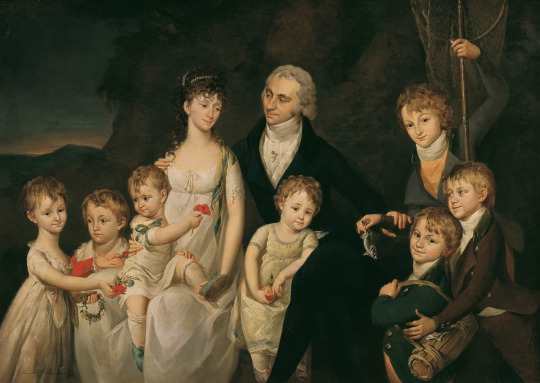
Barbara Krafft, Die Familie Anton von Marx 1803
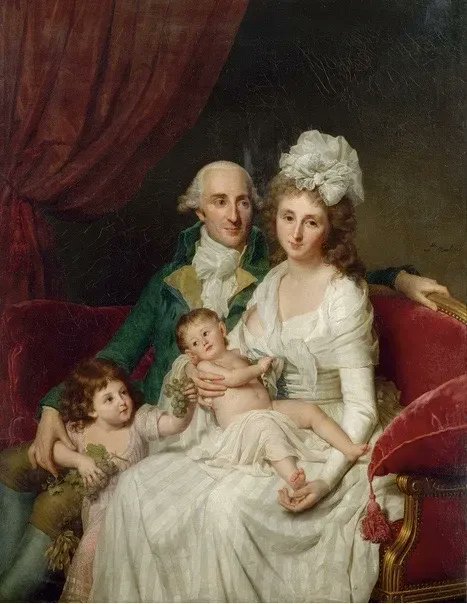
Marie-Geneviève Bouliard,Monsieur Olive & family 1791
#i have a soft spot for the fragonnard one#and the one with the desmoulins family#but hey if you weren't in love with desmoulins when you were a teen your french history teachers failed you
13K notes
·
View notes
Text
Camille Desmoulins and Maximilien Robespierre – doomed by the Revolution?
a second part of the answer to the ask kindly sent by @iron--and--blood - first part can be found here
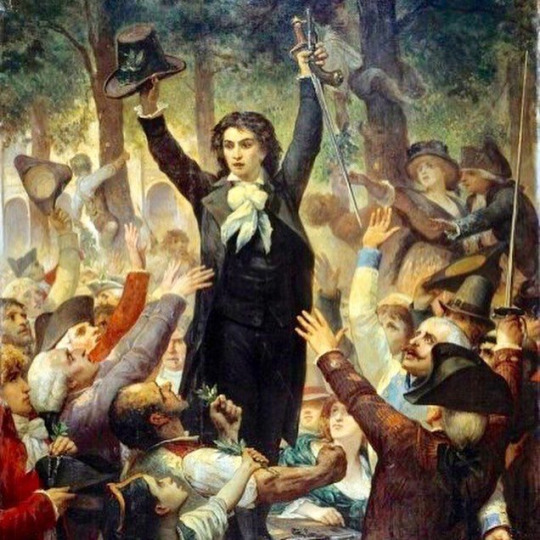
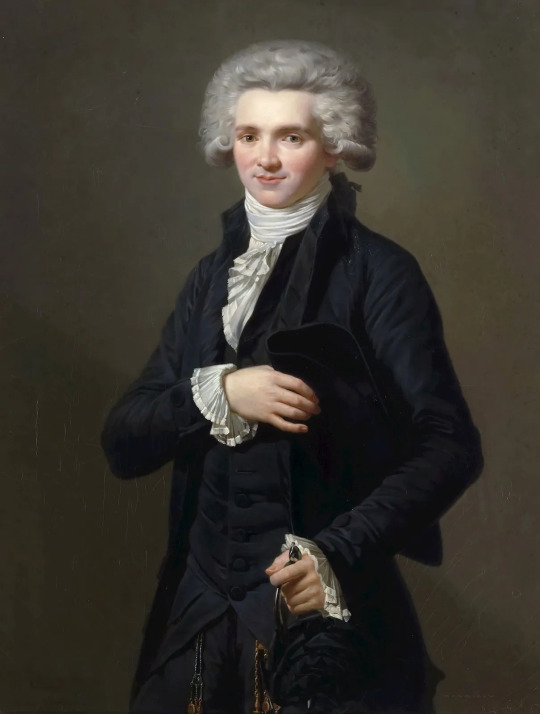
Okay, so I tried to follow the sources and I ended up missing what is arguably the key question. I think that there is enough evidence that warrants seeing Camille and Maximilien’s relationship as a ‘friendship torn apart but the revolution’, but could it in fact be something more that the chain of events of the mid-1790s ended up destroying?
(aka the good old “were they gay?” question)
It’s probably not surprising to anyone that there is no conclusive evidence that would suggest that either of them was definitely queer or that they were involved in some kind of a relationship. For context, the French Constitutional Assembly did decriminalise homosexuality, since there was simply no mention of private same-sex relationships it in the penal code of 1791.
Of course, there would still be a stigma surrounding queerness, seeing how France was a Catholic country – well, up to that point. On the other hand, it is also important to remember that anyone who received a higher education at that time would be well versed in classical authors (Greek and Roman that is), so they would have a framework for a positively viewed queer attraction/relationship (I'm mostly thinking of a kind of Alcibiades/Socrates vibes here. I think it sort of fits? Well it does in my headcanon anyway...). Camille especially seemed to be really into classics, making references to classical authors, history or mythology in approximately every other sentence.
CAMILLE – VICES HONTEUX AND A POSSIBILE BICON
If we consider Camille, I think it is clear that he was attracted to women. I think that the historical sources show that he genuinely did love his wife - Lucile - although it may also be true he was bit of a cad. There is a whole deal with him and Lucile’s mother with whom he apparently exchanged some flirty letters? I honestly need to look into it more at some point.
That said, attraction to women of course doesn’t exclude attraction to men. The one thing that would suggest Camille might have pursued a same-sex relationships is the reference to “vices honteux“ (shameful vices), which Saint-Just claims were attributed to Camille by Danton. We also learn from Robespierre’s note that this refered to something that was ‘totally unrelated to the revolution’.
So we know it’s something that would be seen as ‘shameful’ behaviour, but nonetheless a private matter. Could it be interest in same-sex relationships? It’s of course hard to say, but the theory is not completely implausible. For a discussion about this, I recommend this article.
MAXIMILIEN – A CONFIRMED BACHELOR?
With Maximilien Robespierre, it gets a little more complicated. He was essentially a confirmed bachelor, living with a family that adored him but that was not his own (and also a dog. He had a dog.) Talk about a found family trope!
Some sources claim that he was engaged to Éléonore Duplay, but Robespierre’s sister for one vehemently denies this. It’s true that he could probably easily have married her – I can’t imagine her family being opposed to it, far from it probably – but the fact is that for one reason or another, he did not.
He also didn’t really seem to capitalise on his massive popularity among the Parisian women. (Though, to be fair, neither did Rousseau and he was… well I guess he was his own version of heterosexual.)
Sure, one can interpret that as Robespierre being a workaholic or putting the revolution above everything else, but I personally think it is very possible that he would be considered to be on the asexual spectrum by today’s standards.
That said, although France was moving away from institutionalised religion at that point, Catholic guilt could certainly play a role, especially in someone who prided himself in his moral conduct and was told to be rigid about the rules. So the possibility of him being closeted as an explanation for his lack of interest in women would also not be completely off the table.
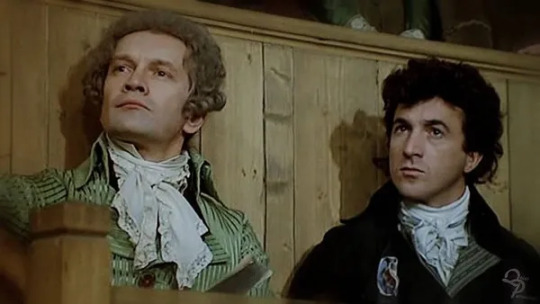
As to Camille and Maximilien being together in some way? I think there is certainly a precedence for this type of relationship in adolescence. Seeing that they have studied together (and shared enthusiasm for classics probably), it is not impossible, though of course, it is highly speculative.
I think it is also fair to say that Robespierre went above and beyond for Camille until the last few months. That is something he probably would have not done for many other people. He actually said as much himself:
“Learn, Camille, that if you were not Camille, one could not have so much indulgence for you.“
Was it because Camille was universally liked by the revolutionaries for all the good he has done? Possibly, but I think one can also read more into it. It certainly suggests that Camille was special in some way, and the fact that Robespierre uses ‚one‘ instead of ‚I‘ does not necessarily mean he is not speaking about himself here.
CAMILLE AND MAXIMILIEN IN THE MEDIA
When it comes to media portrayal, the relationship often comes across as queer-coded - to an extent.

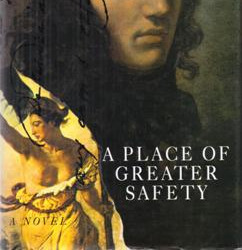
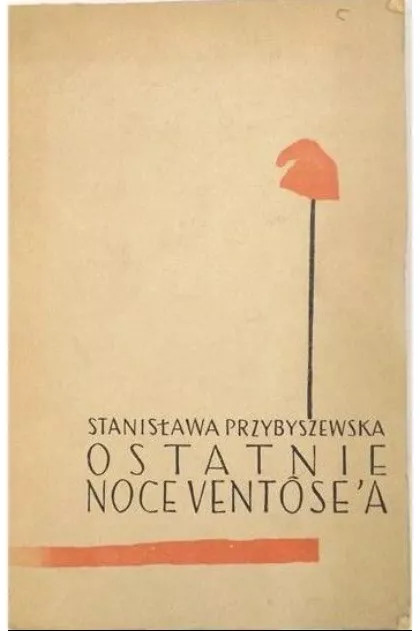
In La Révolution française, this aspect is more prominent between Robespierre and Saint-Just, but with some well-timed smiles and glances, it almost reads as a tragic love triangle between the three. There are some unfortunate implications however, mainly that the hints of Robespierre's queerness in the movie are implicitly associated with his descent to tyrany. Ugh. (And let's face it, a kind of effeminacy linked to villainy as well. Honestly, who thought that kind of portrayal would be a good idea? Kudos for making a historical movie about the French Revolution come across as homophobic I guess.)
Hilary Mantel straight-up makes Camille Desmoulins bisexual (ish?) in A Place of Greater Safety, though there are <a lot of> issues with that portrayal, as discussed here (watch me linking another mutual's great post! Frevblr is truly the best). Not sure how the relationship with Robespierre is presented here since it’s one of the books I’ve been in the middle of for months.
And then there’s Stanisława Przybyszewska of course. She would honestly warrant a separate post, but long story short: in her works, there is no doubt about the fact that she portrays the relationship between them as queer. She invokes the Erastes/eromenos dynamic between them (quite explicitly, referring to Camille as an ephebe at one point) and makes the attraction between the two seem palpable. There is plenty of queer (under)tones to be found in The Danton Case, but in Last Nights of Ventôse , she straight up interprets the fall of the Dantonists as Camille running into Danton’s arms to spite Robespierre for snubbing him and rejecting his devotion (romantic advances?). And it gets quite physical – not in a way that would warrant an E rating, but it would certainly deserve one for the sheer emotional intensity.
#there is a great fic that explores the idea of Robespierre being ace btw. Features some A+ philosophical discussions as well#the only issue is the fact that the other person in the pairing is --#no - shan't say!#frev#french revolution#asks#camille desmoulins#maximilien robespierre#queer history#frevblr#frev community#robesmoulins#1700s#history#stanisława przybyszewska#hilary mantel#a place of greater safety#the danton case#la révolution française#la revolution francaise#bisexuality#asexuality#Éléonore Duplay#robespierre#desmoulins#queer analysis#saint-just#louis antoine de saint just#lucile desmoulins#georges danton
102 notes
·
View notes
Photo



Camille and Lucile in “Ça ira, mon amour.”
#camille desmoulins 1789#lucile desmoulins 1789#toho 1789#1789 les amants de la bastille#1789 musical#gifs#have I mentioned how much I love Lucile?
20 notes
·
View notes
Text
Desmoulins: Uh, Max, it says here, “Dogs Without Leashes Will Be Fined 100 livres”...
Robespierre: *crying* They don't have that kind of money?!?!!??
#camilles just like 'why is it that when i mention dogs you immediately lose the ability to function like a normal fuckin dude?? wtf???'#french revolution#frev#incorrect quotes#robespierre#desmoulins
26 notes
·
View notes
Note
Citoyen Geordie,
I have already mentioned that I pay no need to being called out, owing to the fact Lucile and Robespierre think I am quite reckless enough already in the press aristocratic nature of the custom; however, in your case I might perhaps be prevailed upon to make an exception, as the meeting would be so elegantly dramatical upon both sides.
I am glad to hear you have such a kindness for my republic, but I must take objection to your fawning and slavish notions about Bonaparte, at whose feet you seem to fall as ingratiatingly as the pretty Persian eunuch Bagoas before the tyrant Alexander - although evidently with less success, as I have never heard him proposing to take you to bed, despite your best efforts, and his making so encouraging a comment about the Tsar of Russia. The New Caesar he may be, but I am very far from admiring traitorous generals who put to the sword with vile treachery the greatest republics the world has ever seen. However, that is beside the point.
I do not deny that I may possibly have pursued your journal, but you can hardly blame me, as there are very few who write with such an excellent imitation of my own wit, and I was in need of something entertaining. I shall endeavour to send them back to you if I can ever recall where I put them; I am afraid they may be a trifle damaged with black coffee, but they are still perfectly legible.
Your disclaiming a sullen countenance is patently absurd! By all I have read, your moods are far more gloomy than my own, which are generally dispelled by a few ill-advised jests at the expense of my friends, whilst yours drag themselves out through interminable Romantic cantos as the miserable Manfred lusts after his sister. And as for your not looking upon death's door, it is positive that your health is far worse than mine, my own life being cut short by a violent martyrdom in the cause of liberty, whilst you succumbed to a touch of fever; not to mention your continual dalliance with sunstroke and your strangely disobliging teeth!
In reference to your last point, I thought it was plain that I do not object to your borrowing from my irresistible mannerisms, but merely to your failure to write a single line concerning me! The matter is easily remedied. Hock and soda you shall not have, the aforementioned wine being German and consequently barbaric, but you are welcome to burgundy if you pay me due reverence in your writings in future.
As for my "point that no gentleman would make", I never professed to be a gentleman, and I refer you to my remarks in the opening of my journal upon Pro Caelio. If you do not desire to be cast as Pulcherella, and cher Augusta as the revered Medea palatina, then you ought to be more careful to oblige me! However, since you did acknowledge my heroism, and flattery is entirely irresistible to me, I shall remain for this evening
yours in temporarily arrested wrath,
Camille Desmoulins
Salut et Fraternité, my dear Citizen George - (that you pretend to the title of Lord I am aware, but I cannot acknowledge aristocratic pretensions; as for my addressing you by christian rather than last name, you will agree it is much more comic.) For an Englishman, your sentiments appear tolerably reasonable, and your letters are certainly amusing; however, I have a strong objection to make to your mentioning Monsieur de Chevalier Saint Just within them and never once mentioning me, despite the fact it is quite clear to any with the least knowledge of the fashions and intellectual currents of this age that your Style is conspicuously derived from mine! In order to demonstrate this point beyond question, let me draw your attention to the portrait of myself by Citizen Joseph Boze: https://en.wikipedia.org/wiki/Camille_Desmoulins#/media/File:Camille_Desmoulins_-_Joseph_Boze.png.
You here perceive, unless you are quite as blind and as provincial as Polyphemus, serpentine and lightly disheveled dark curls, a melancholy and brooding air, a distinctly classical nose and mouth, a luminous and restless eye, and a frilled necktie half-hidden by the shadows of the palette, which catch up and intensify the dim mystery of the sitter; all of which, mon cher Christmas (as such, I have been informed, is the name you prefer to go by), are now ignorantly termed to be Byronic attributes, as if no one but George Gordon Noel Byron, 6th Baron Byron, had ever employed them! Add to this your scathing wit, your appreciation of the glories of the Ancients, your predilection for writing with a hangover, your swiftly-shifting humours of unseasonable gaiety and black despair, your habit of throwing your countrymen into fits of puzzlement and concern and incurring banishment for carmen et error, and it becomes a simple case of plagiarism! You may think yourself extremely Original in engaging in incest, calculating, no doubt, that I would not have had time for the pursuit in the midst of all my patriotic duties, but if that is the only defence you can find it will not do at all. You had better reply with all haste, as I already have a philippic forming in my head, and if I grow bored in the interim, or simply become very attached to the phrases, you shall not be able to prevent me from publishing it.
Yours with slanderous intent,
@thelanterneattorney
Dear God, what a veritable wall of words! I doubt any poor fellow was before presented with his faults in such a devilish involved manner - & I am used to missives that look like essays - my lovers send them all too oft - & usually burn the fattest ones when my debts disallow coals. Heigho, pistols at dawn et al it is then! Let us see if I can make a sentence string together well enough in prose to answer this, without becoming more ennuyé than is usual of that yawning verb.
Firstly: George?! Of all the conjugations of my name, that one has fallen into such a disrepute that it is almost as obscure as the locative & about as oft used. You hardly insult me - simply perplex, which seems your usual mode of carrying on - & to be addressed as a citizen of a republic I admire & who gave birth to the new Caesar can be taken as nothing save a compliment! I had far rather be French, Italian or Grecian than inhabit ye nook-shotten isle of the stinking corporal Arthur. However, I beg to correct your assumption of my nationality - I was born & raised in Aberdeen, & as such am more Scots than English - & ask you to to at least use Geordie, if you must be so damn familiar.
Next, my correspondence: aforementioned reference to the Chevalier Saint-Just is not within my letters - which would be a plain case of traitorous friends - of which I have many - or traitorous lovers - of which devils there are still more - but it makes up an entry in mine journal from 1813-14. This suggests burglary - Massena @chicksncash, if you helped him I swear by Jove to call you out! - which is far more concerning when coming from a rather insane journaliste. I believe property is sacred under your Declaration of the Rights of Man &c, & so if you would give me back my deuced scribblings, I would be grateful.
Yon portrait is lacking from ye missive, so I shall ask Teresa to aid me in supplying a copy of it alongside one of my own, for comparison:
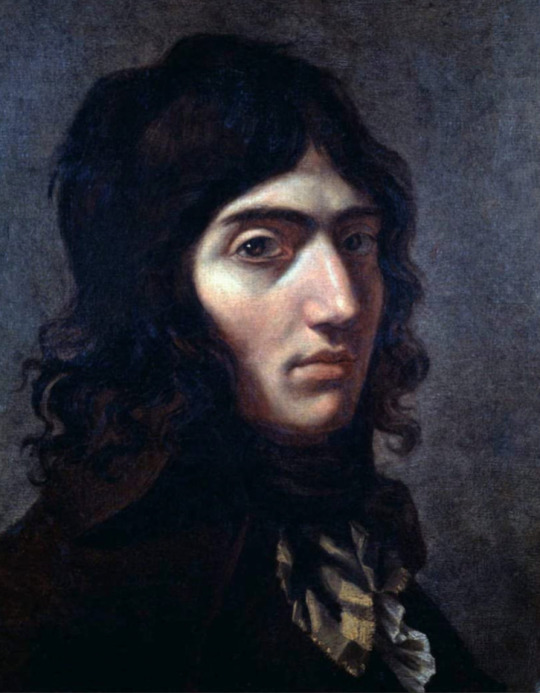
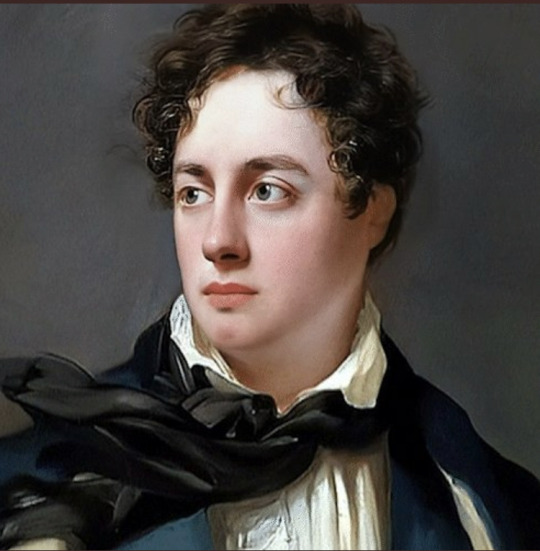
'Pon the subject of my supposed plagiarismes: My curls are certainly not serpentine - simply charmingly windswept, as is to be expected from traipsing about in sublimity - & bear not the lightest resemblance to ye ancient tempted the Serpent, being far too short. As for this melancholia of air - Phah! I have no such sullen countenance as yours - although I am a devil in a mood - nor do I look upon death's door with consumption. Yon "dim mystery of the sitter" is certainly the kind of trash dear Polly-Dolly would write about me, but is hardly apropos from a man of some literary talent. This Byronic air you speak of is hardly the depression of the incarcerated firebrand, as is evident in your portrait, but simply the inevitable absence of ye world traveller pondering the mountains & smoking.
I admit that I gain some attributes of my manner of carrying on from you, but is not imitation the sincerest form of flattery? If ayne fellow of talent - @franzliszt-official for example - came up to me with a reputation for imitating my mannerisms, I should offer him hock & soda on ye spotte! My only defence for stealing your gay moods & melancholia is that I found you fascinating as an infant, & something about your heroism must have wormed into my unformed mind to lodge there.
Your final point is one no gentleman would make, let alone acknowledge. I do not know what that harpy my wife has been saying, but her words are driven by spite and disappointment in my "failure to reform", & are not worth their damn salt. You would do well to refrain from mentioning such toss again.
Yr humble servante,
Byron.
#frevblr#frev#Camille desmoulins#lord byron#who on earth is going to get the references in this...#Possibly @enlitment
20 notes
·
View notes